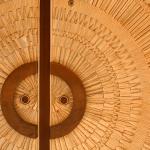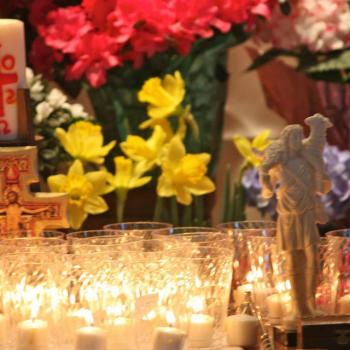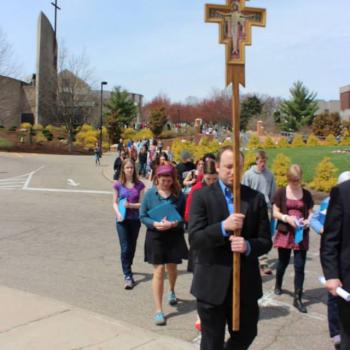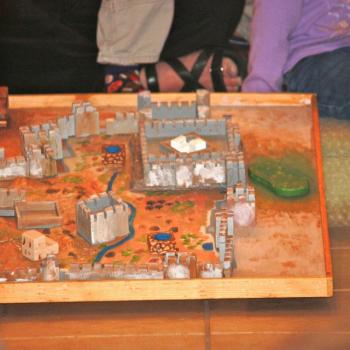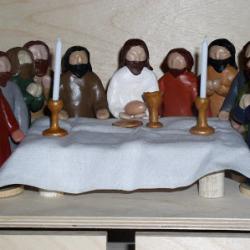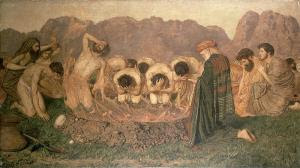
Priesthood begins on Calvary but ends on Mount Tabor; while instead, marriage begins on Tabor but winds up on Mount Calvary. When my best priest friend shared this insight with me, I laughed knowingly, though I had not yet been to Calvary, so I really understood nothing.
The Last Word
I have since had the honor to witness as two different men, whom I love very much, cared for wives, both of whom suffered through years of debilitating and disfiguring terminal illness. In each case, the diagnoses the women received left no room to hope for a medical cure. These husbands watched as the women they loved melted slowly but inexorably to skeletons; they sat helpless vigil as the flesh they had clung to – once a source of living joy – was eaten away with pain. Throughout these long sicknesses, both husbands changed: each developed capacities I never knew they’d had. They took over the cooking, got up several times per night to attend to their wives’ needs, helped to bathe them, and even learned some nursing skills. And when all possible caregiving tasks had been exhausted, they modeled Mary, who stood at the foot of the Cross and shared the gift of her loving presence.
This experience of Calvary looks very different from what we often think of when we claim that some event or another is “crucifying” us.
A joy can develop, even during the most humiliating affliction, when the gaze of love is exchanged between two people who have shared a history and lived one life between the two of them. Think of how Mary and Jesus must have looked at one another on Calvary: how their faces must have become radiant when their eyes met during those last hours! There is nothing more beautiful than the face of a loved one whose gaze of tenderness tells us: It is good that you exist…
Neither of these husbands complained, as they stood beside their dying wives. An atmosphere of gentleness and love permeated all they said or did. And even as the women experienced tremendous pain and compromised dignity, they also, somehow, took care of their husbands: with a weak pat of the hand, as if comforting a baby, or with a grateful smile, or with a glance filled with solicitous attention. To be privileged to see these things can’t help but suggest to us that love is indeed stronger than death.
Calvary, then, is also a place of joy, a joy far greater than that of Mount Tabor, where Peter had wanted to build tents for Moses, Elijah, and Jesus so that they could all remain together, basking in the glow of beatitude. I’m certain that Mary never had the impulse to set up camp beside the cross so as to prolong the experience of watching her son die. Yet, she must have experienced a kind of fullness when the finality of death laid bare the certain fact that love will always have the last word.
Sweating Blood Is a Thing
What I thought I knew of Calvary when my friend made his remark was actually an experience of the Mount of Olives. We’ve all been there – whether we claim no spirituality at all or whether we’re religious adherents – that place where we sweat blood and and wrestle with the temptation to run away screaming.
In Gethsemane, it’s always night time, and our friends are always fast asleep when we need them most. Among these olive trees, people rarely smile; and if they kiss, it’s usually a betrayal of life and love. We can be completely alone there and betray ourselves, or allow our eyes to deceive us, or listen to voices that want only to annihilate us. Even our own chemistry betrays us by signaling that we have only two choices: to slash out wildly or flee naked into the pathless night.
And yet, thousands of times a day, people say some variation of these words: Not my will, but Thy will be done: when a mother gets up to soothe a wailing child in the middle of the night or when a fire fighter runs into a burning building or when a man cleans vomit out of his mother’s hair, these people deny their own will (to sleep, to remain safe, to avoid terrifying facts) and instead obey the will of Something greater, whether they call that Something “duty” or “affection” or “God.”
The Olivet of marriage consists in the desire and threat of divorce. In very sad cases, to obey the will of Something greater means to abandon the marriage. In other cases, though, to obey the will of Something greater means to stay and face the unspeakable horror of the one, ever-loving, monstrous thing that one cannot stand, does not approve, and will neveraccept – and then embrace it and drink it to the dregs.
No one reaches the unexpected and enigmatic joy of Calvary without passing through this dark wood.
My Own Place of the Skull
After my surgeryat the beginning of December, 2017, my husband had to administer an impressive schedule of medicines for me, around the clock. Those prescriptions that come in pill form each had to be crushed and mixed with liquid before he could send them through the tube that snaked through my nose, directly to my stomach. He also had to prepare my nutrition, an ivory-colored powder, which smelled cloyingly of a fake vanilla that could not quite mask its chalky bitterness. Once he had measured and added water to it, he had to hold up the pitcher and pour it slowly into the tube – too fast, and my stomach would twist and cramp from the shock. In addition, he had to regularly change the dressing on my arm. He performed all these tasks with quiet kindness while also preparing the family meals, driving our daughter to school and back, and continuing to fulfill all his teaching and scholarly duties at work.
That year, when Christmas was upon us, he realized that he hadn’t lit the Advent wreath, not even once during the whole of December. He said that he felt as though maybe he’d “neglected” Advent, until he had the realization that his preparation that year was to welcome and care for Christ in the flesh of his wife – that is, Christ in my flesh.
Perhaps it’s fair to say that this was our first taste of that ultimate Calvary of marriage. Certainly the wound on my wrist caused me to wonder over Christ’s pierced wrists. At least at the very beginning of the journey, my doctors couldn’t rule out the possibility of death, so we had to look mortality in the face, with all the terror and sense of the unknown that this implies. I saw the same gentleness and patience in my husband that I had also witnessed in those two men I described at the beginning of this essay. What a tremendous sense of certainty this newness generated in both of us!
Dueling Deities
Today my husband and I find ourselves on a new mountain: neither Calvary, nor Tabor, nor even the Mount of Olives; this time we have arrived on Mount Carmel, where Elijah once challenged the prophets of Baal to a contest (1 Kings 18: 21-39):
Elijah then said to the prophets of Baal, “Choose one young bull and prepare it first, for there are more of you. Call upon your gods, but do not start the fire.” Taking the young bull that was turned over to them, they prepared it and called upon Baal from morning to noon, saying, “Baal, answer us!” But there was no sound, and no one answering. And they hopped around the altar they had prepared. When it was noon, Elijah taunted them: “Call louder, for he is a god; he may be busy doing his business, or may be on a journey. Perhaps he is asleep and must be awakened.” They called out louder and slashed themselves with swords and spears according to their ritual until blood gushed over them. Noon passed and they remained in a prophetic state until the time for offering sacrifice. But there was no sound, no one answering, no one listening. (1 Kings 18: 25-29)
Instead of the prophets of Baal, we confront the prophets of Greed, Calumny, Power, and False Witness. Weirdly, these prophets also do a lot of hopping. In our corner, we stand by our God, whose name is Love. His respect for human freedom makes him appear, sometimes, as though he sides with those who are wrong (“I say to you, love your enemies, and pray for those who persecute you, that you may be children of your heavenly Father, for he makes his sun rise on the bad and the good, and causes rain to fall on the just and the unjust” – Matthew 5: 45-46). This is because he gambles everything on the strength of attraction to the unarmedbeauty of his own love and mercy made vulnerable flesh. Still, despite the fact that he chooses his own torture and death rather than force anyone to agree with him, he never remains aloof from those who call on his name. His response is to set fire to our sacrifices: each time we fit our person according to the dimensions of his mercy, he ignites our lives with an energy we could have never supplied.
Meanwhile, the prophets of petty gods continue to hop about and slash themselves in their aridity and shame. They will discover, one day, when they call out in their need, “no sound, no one answering, no one listening.”


